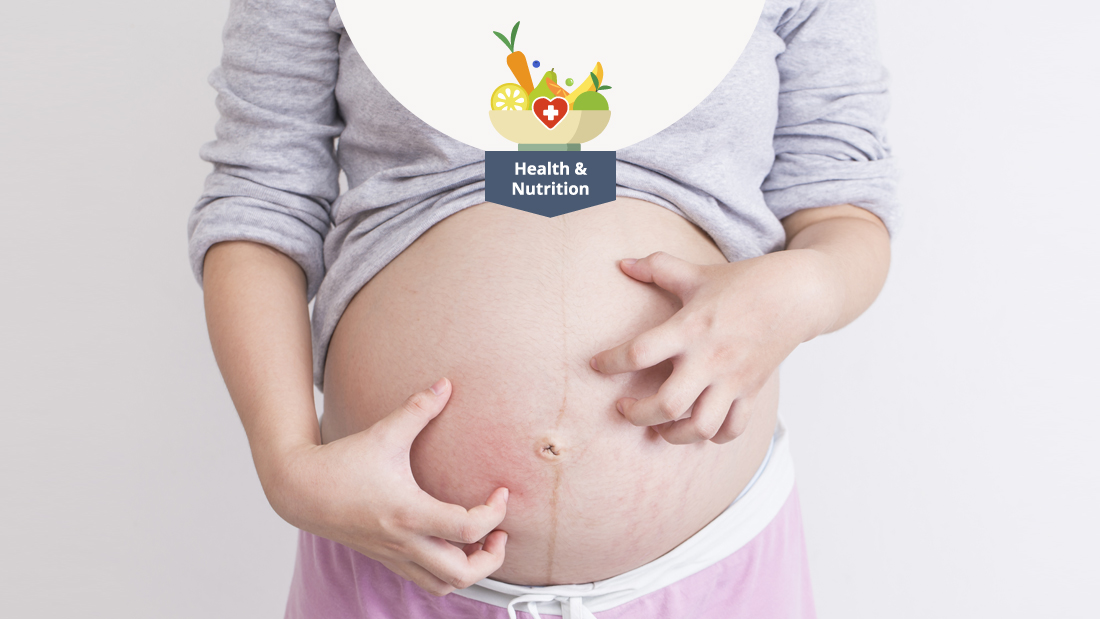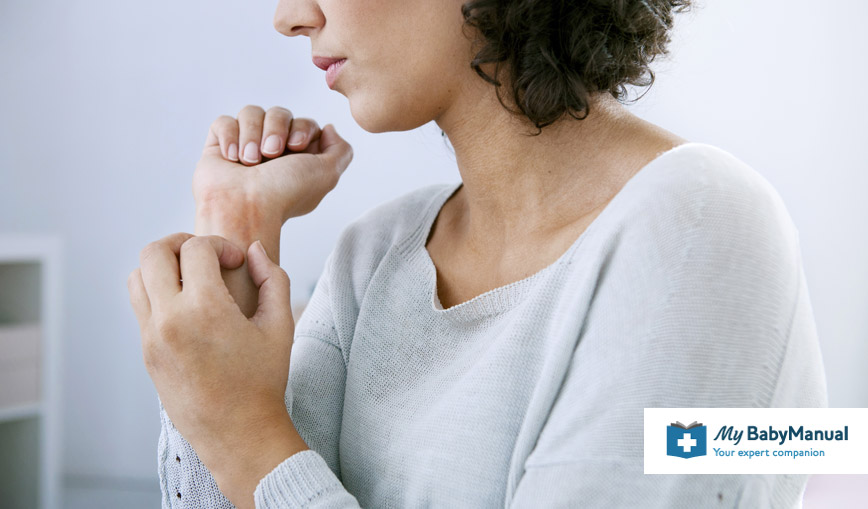
Extreme itching in pregnancy – Intrahepatic cholestasis
Mild itching is an annoying symptom which may occur as you continue through your pregnancy. It’s quite common and is related to the increased hormonal activity in your body and the stretching skin of your belly as the baby grows and develops, particularly during the last few weeks of your pregnancy.
Typically, the itching doesn’t develop into a rash and, in most cases, you will just need to take extra steps to make yourself more comfortable. Some women find their symptoms are eased by:
- wearing loose fitting clothing
- taking cool baths
- using fragrance-free lotions, oils and moisturisers
However, do make sure to tell your midwife or doctor that you are experiencing itching symptoms, particularly if your symptoms get worse at night.
In severe cases it may need further investigation.
Extreme Itching – Intrahepatic cholestasis (obstetric cholestasis)
As the pregnancy progresses some women may begin to experience a sensation of severe itchiness on the palms of their hands and soles of their feet. Generally, it occurs in the third trimester, but some women have suffered as early as eight weeks, so you should be aware of the condition and the risks.
The itching will then spread to other areas of the body and a yellowing of the skin and whites of the eyes may also occur. If this happens to you contact your midwife or doctor because these might be signs of ‘pregnancy itching liver disorder’ known as intrahepatic cholestasis of pregnancy (ICP) – also known as obstetric cholestasis. This condition will need medical attention and monitoring for the duration of the pregnancy and throughout labour.
Causes of intrahepatic cholestasis
Intrahepatic cholestasis is a genetic condition affecting normal liver function, causing digestive fluid (or bile) in the liver cells to build up and fail to properly release into the gut, to help digestion of food. It is thought that the big increase of oestrogen and progesterone in the body when pregnant may trigger the condition.
Not only can this disorder be extremely uncomfortable for you as an expectant mother, but it could also cause problems for your unborn baby. These increased risks are serious and include premature delivery and stillbirth. When your baby is born, it is possible that they may also display signs of fetal distress from the effects brought on in labour of a slow heart rate from the lack of oxygen.
Intrahepatic cholestasis is rare and affects only one out of every 160 expectant mothers each year in the UK. Medical studies have also shown that mothers-to-be with Indian, South American, Pakistani and Scandinavian heritage are more susceptible to developing the disorder. It may also run in some families.
Know the symptoms of ICP and get treatment
It is important to recognise the signs of intrahepatic cholestasis. Symptoms experienced will include, but are not necessarily limited to:
- Persistent itching without a rash – particular irritation to the hands and feet
- Itching is worse at night – in some cases unbearable
- Dark urine
- Pale bowel movements
- Yellowing skin
- Yellowing whites of the eyes
If you are diagnosed with ICP you and your baby will need to be monitored and given the appropriate medical support. This may include weekly liver function and bile acid measurement tests, as recommended by the Royal College of Obstetricians and Gynaecologists (RCOG) and the British Liver Trust. These are designed to monitor the health of the baby and to judge the best time for labour to take place.
Because of the increased links with stillbirth, it may be suggested that between weeks 37 and 38 you will need to have an induced labour or a caesarean section. This would take place in a hospital under a dedicated, consultant-led team. In particularly serious cases, it might be necessary for this to be done at an earlier stage of the pregnancy, to give you and your baby the best chance of a safe delivery
Keeping comfortable
You are likely to want to find ways of soothing and reducing your discomfort. Suggested methods to control the irritation include:
- fragrance-free skin creams, salves and ointments such as aqueous cream
- medication – some prescription drugs are available to reduce the itching and levels of bile salt build up
- daily supplement of vitamin K – to prevent problems with bleeding after birth, as the condition reduces vitamin K absorption in your body, which helps your blood to clot
Post labour and future pregnancies
After your baby is born you can expect the signs and symptoms of ICP to disappear. A follow-up visit to your GP will check this and a blood test will be taken to ensure that your liver function has returned to normal. There are no known long-term health problems associated with the condition.
Unfortunately, if you have had intrahepatic cholestasis you will need to be prepared for a repeated experience of the condition during future pregnancies.



